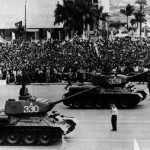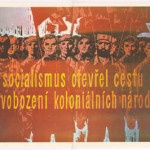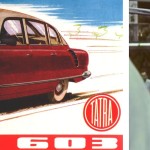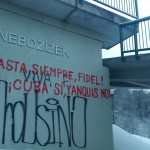From the idyllic life of the 1960s, to the post-1989 grudges. Over half a century in the relations between El Líder Máximo and the Czech Lands
The history of relations between Havana and Prague, from when Fidel Castro came to power, until his death, possesses the stereotypical aspects of a great romance turned sour. After all, it could not end otherwise, given the changes on the banks of the Vltava following 1989, and the Velvet Revolution.
It is true that in recent years, partly due to the death of Václav Havel, protecting human rights in the world is no longer a priority of the Czech foreign policy, partly also due to the recent openness of the Cuban regime, the relationship between the two has shown signs of timid improvements. The idyllic situation of the past, however, is now a distant memory. A definitive test took place last November, when the Czech Republic stood out for being one of the countries of the world where there were fewer tears shed for the death of the Líder Máximo.
The obituary from the Foreign Minister, Lubomír Zaorálek, seemed very cold with the Social Democrat stating:“Maybe once Castro fought for freedom, but I cannot forget that in 1968 when we fought for our freedom, he was among those who supported the USSR and the invasion of Czechoslovakia”. Along the same lines the Prime Minister Bohuslav Sobotka continued:“The revolutionary of the first hour, able to embody the great hopes of his people, gradually turned into a dictator”.
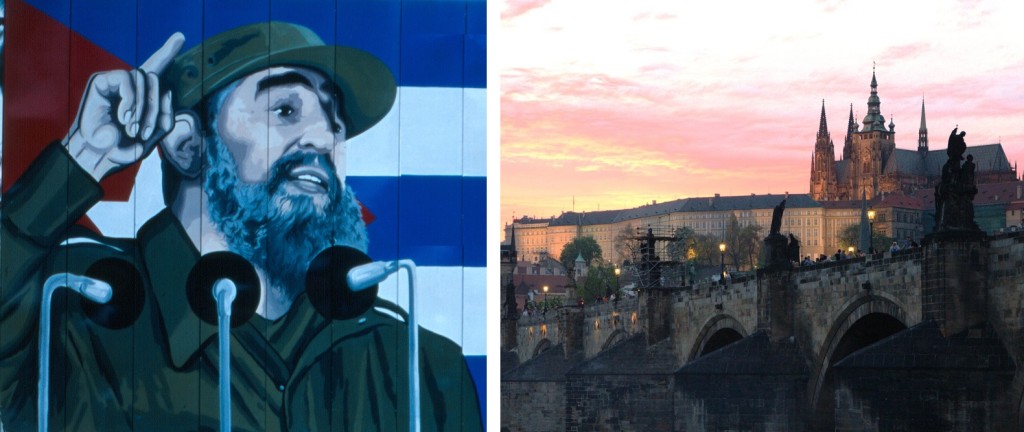 Castro’s death was also the cause of yet another dispute between Prague and the EU. The vice premier Andrej Babiš lashed out against the sorrowful message of condolence expressed by the EU Commission President, Jean-Claude Juncker, which he defined as “shameful”. Moreover, a transversal group of Czech MEPs asked for the EU’s official apology, after the spokesman for Juncker had classified the Czech opinions on Castro as “a narrow viewpoint of history”.
Castro’s death was also the cause of yet another dispute between Prague and the EU. The vice premier Andrej Babiš lashed out against the sorrowful message of condolence expressed by the EU Commission President, Jean-Claude Juncker, which he defined as “shameful”. Moreover, a transversal group of Czech MEPs asked for the EU’s official apology, after the spokesman for Juncker had classified the Czech opinions on Castro as “a narrow viewpoint of history”.
But let’s jump back almost sixty years, when the love between Cuba and the former Czechoslovakia exploded, one of the very first countries to recognize the new regime of the “Barbudos”, and to open its own consular representation in Havana. They did so in March 1960, a few months after the seizure of power by Fidel Castro, and seven months before the opening of the Embassy of the USSR in Cuba.
In this regard, it is worth remembering that in 1960, even though it was just two years away from the historic crisis of the Soviet missiles in Cuba, the attitude of Cuban authorities towards the USSR was still very cautious. Castro at that time did not plan to become a satellite state of Moscow, perhaps also being aware of how its people were permeated with anti-communism. From this point of view, it is quite likely to think that in those early months after the Castro revolution, the Embassy of the smaller and less intrusive Czechoslovakia, was operating in Cuba as a long arm of Moscow.
The fact is that the relationship between El Comandante and the Czechs tightened, aided apparently also by the particular weakness that Fidel had for the beer and specialties of Bohemia. This curiosity has been recounted by Vladimír Pavlíček, who at that time acted as ambassador in Havana, while also keeping many memories of a personal nature. “So there we were practically the only ones in Cuba, and Castro had a great customary relationship, we saw each other virtually every week, as well as Che Guevara. His secretary called my wife quite frequently, and asked her if El Comandante could stop by to have dinner at the residence. He particularly loved our typical hot dog and obviously our Pilsner”. Who would have thought that the Párek v rohlíku, the sausage in a bun, would have had such a fan in the Caribbean, but apparently it did.
Another passion of Fidel, of course, was for the fairer sex, blondes in particular, and Czech women were no exception of course. “When a Czech film delegation arrived in Cuba”, the ambassador Pavlíček again stated, “Fidel’s full attention was paid to our actresses, and we could not do anything to divert it”.
Blondes aside, relations between Cuba and Czechoslovakia then began to become really close. For the new Caribbean regime and its survival, the aid that arrived from Prague was revealed to be fundamental, in particular arms supplies, machinery, agricultural vehicles and financial loans. Czechoslovakia, clearly of Soviet inspiration, gave a strong contribution also in other forms, collaborating for example with the organization of the armed forces and security services, by sending hundreds of military instructors and other experts. In Cuba in the ‘60sa community of several thousand Czechs and Slovaks arrived. At the same time, there were many Cuban students who were guests in Czechoslovakia, thanks to scholarships granted by the government in Prague.
When in the autumn of 1960, Fidel sent his lieutenant Che Guevara to Eastern Europe, the first country he visited was Czechoslovakia, where an agreement was signed for the creation of a Zetor tractor factory for Cuba, with a capacity production of 2000 vehicles a year.
There were also other forms of aid in the period. Czechoslovakia represented Cuba in the United States, the country with which the Castro regime did not then have diplomatic relations. The Czechoslovak embassy in Washington possessed a special “Cuban section”, at the head of which was the diplomat František Telička, namely the father of Pavel Telička, the future Czech European Commissioner, now an MEP.
Only the Prague Spring and the early signs of detachment from the Soviet dogma had the effect of undermining the idyllic relations between Fidel and Czechoslovakia. The relationship started to freeze at all levels, and at the beginning of 1968, Cuba began to return its students from Czech universities. From 268 in 1966, the number of them dropped to just 31 two years later.
On 23 August 1968, following the invasion by Warsaw Pact forces, Castro buried the socialism with a human face of Alexander Dubček with these words: “Prague was marching toward a counterrevolutionary situation, toward capitalism and into the arms of imperialism. We accept the bitter solution of sending troops in Czechoslovakia and do not condemn the socialist countries that have made this decision”. Words for which perhaps history will absolve him, but many Czech citizens certainly never will.
A few months passed before the normalization period arrived in Prague, even regarding relations with the Socialist Republic of the Caribbean Sea. Castro, now reassured, came on a visit to Czechoslovakia three times, greeted always triumphantly by the authorities of the time. The most significant trip, which lasted six days, was that of June 1972, when El Comandante was honoured with a First Class Order of the White Lion, the highest honour of the country, and was awarded an honorary degree by Charles University. Shorter visits took place in 1973 and 1986.
All this was before the Velvet Revolution, in 1989, which decreed a radical shift in relations between the two countries. It could not be otherwise, following the advent of a dissident arriving at Prague Castle, a genuine anti-communist, such as Václav Havel, a revolutionary figure poles apart from the Líder Máximo. The situations in which Prague and Havana entered a collision course were inevitable. For example in 2000, when a huge crowd of tens of thousands of Cubans launched a menacing protest in front of the Czech embassy. The UN had just approved a resolution condemning the violation of human rights by the Castro regime, and the text of the document in fact, had been proposed by the Czech Republic, together with Poland.
The most glaring clash, however, was in 2001, due to a classic tale of spies or at least presumed spies. In Cuba two very prominent Czech citizens, both close to Havel, Ivan Pilip, a former finance minister, and Jan Bubeník, a former student, anti-Communist activist, ended up in handcuffs. The charge directed at them was to have met the anti-Castro dissidents, and being of US espionage agents arrived in Cuba to finance subversion and destabilization.
The two, whose journey to Havana had been inspired and coordinated by the American Freedom House organization, found themselves risking a sentence of twenty years in prison. For days there was no way to persuade the Cuban authorities to free them, while Fidel personally launched a fiery tirade, and Cuban newspapers spoke of the Czech Republic as a servant of the United States. Havel at first reacted controversially, speaking of “arrest in a blatant violation of human rights”. Only later, he preferred to take a more concealed position, to avoid, as he himself said, to causing the deal for the release to fail.
The negotiations went on for some weeks, and the Czech government tried all possible channels of dialogue. The then Prime Minister Miloš Zeman asked for the mediation of the member parties of the Socialist International. Culture Minister Pavel Dostál, sent a letter with sorrowful tones to the Colombian writer Gabriel Garcia Marquez, whose friendship with Fidel Castro was well known, in order for him to intercede with the Cuban leader. A delegation from the Czech Chamber of deputies, and President of the Senate, Petr Pithart, left for Cuba. The latter was made to stay in the waiting room for a few days, for a never-ending interview, with a fiery tone, lasting seven hours. Eventually Pilip and Bubeník could return home, but not before apologizing to the Cuban people for their journey, which was not particularly appreciated by Fidel.
The last significant episode of the long distance clash between Castro and Havel, dates back to 2004, when the hero of the Velvet Revolution, no longer President, organized a meeting of the International Committee for Democracy in Cuba in Prague. Havel on the occasion opened the conference with these words: “Cuba is a giant prison, surrounded by a wonderful sea. The purpose of our meeting, and our action is not to break down the walls of this prison with violence, but to energetically ring all of its bells in order to open the doors”.
Also on that occasion the reaction of the old revolutionary was irreducible and fiery: “In Prague it is the usual show, organized by the CIA, to manipulate European public opinion against Cuba”.
by Giovanni Usai





